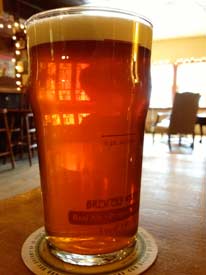Since the resurgence of the microbrewery movement beginning in the early 1980’s that has swept across the nation, I have always held a deep regard for the variety, distinctiveness, and flavors of these hand-crafted brews. Even the Anchor Brewing Company in San Francisco, though too large technically to be considered a micro, their Liberty Ale and Fog Horn Barleywine brews stand almost alone among their peers.
And for a true micro, there’s the Anderson Valley Brewing Company in Boonville, California, that in my opinion, produces some of the best beer on this planet (in particular, their Oatmeal Stout and signature Boont Amber labels). And no, there are no paid endorsements, or in-kind exchanges here, just one sincere beer aficionado that still appreciates a truly great beer. Of course there are many others deserving of being singled out for producing outstanding brews, Terminal Gravity Brewing in Enterprise, Oregon (literally, in the middle of nowhere) is easily another.
But I have to say, when I sampled a couple of the beers at the Brewers Union Local 180 (after we ended shooting for the day), I think I may have found my beer nirvana. Not only were the beers I sampled unearthly wonderful, it was one of the most friendly pubs I have experienced in many long years. And lets just say, in my younger days, I sampled my fair share of pubs across the geographic realm.
As we learn in this story, cask-conditioned beers are still alive, and further maturing in their (cask) containers as they are served to the customer. As publican Ted Sobel of the Brewers Union Local 180 explains, the continuing fermentation process of these living beers imparts subtle and complex flavors to the brew. Because the yeast in the beer is still alive in the casks, the carbonation process occurs naturally within the enclosed cask, and doesn’t overpower the subtle flavors of the brew as may occur with CO2 tank carbonation.
In England, the local pub is thought of as being the “third home”, the first and second being home and work. The somewhat unusual name for the pub, Brewers Union Local 180, came from one of the locals because the original idea was a “union of brewers” coming together to sell beer. Though the original business idea never took flight, Ted Sobel liked the proposed name because for him, the “union” was a coming together of people at their “local” pub, and the “180”, a different meaning of the name than what may appear on the surface (I originally thought it was a union hall that also produced beer for their union members—sign me up:)).
What’s truly refreshing here, a business owner committed to the overall satisfaction of the customer first, with the financial outcome, obviously critically important, but subservient to the first concern.
That is a 180-degree perspective with a fine finish.
Most of the videos featured on Cooking Up a Story were produced, filmed, and edited by Rebecca Gerendasy. Fred Gerendasy contributed as a writer to many of the posts and occasionally as the interviewer. Visit Rebecca Gerendasy Clay – Art and Fred Gerendasy Photography to see their current work.

